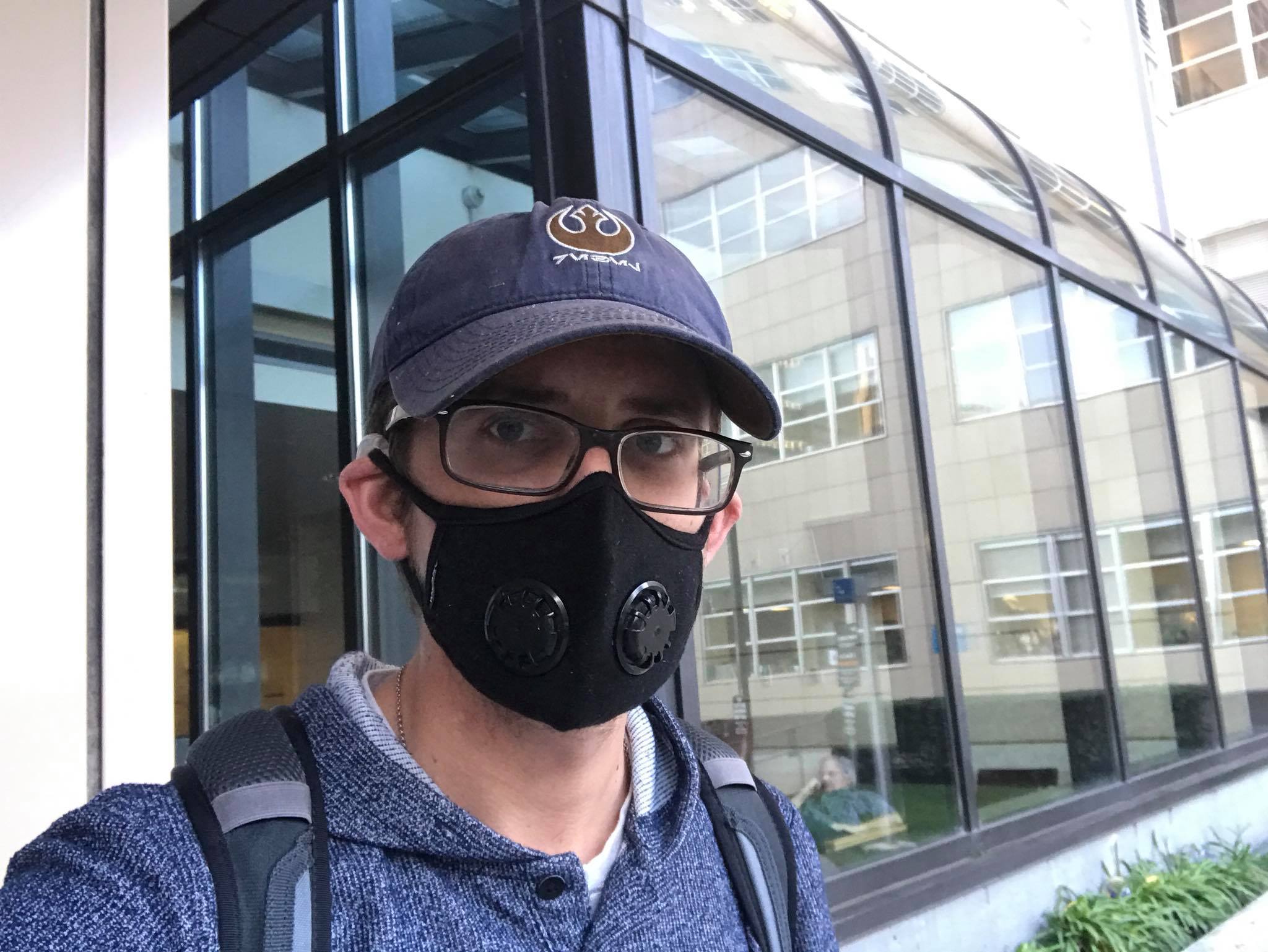Here’s How I Wish I Had Prepared for My Lung Transplant
Written by |

(Courtesy of Brad Dell)
When I first met my lung transplant surgeon, she remarked that cystic fibrosis patients have a great post-transplant life expectancy because we tend to be best prepared for it. We know how to shovel pills by the handful into our mouths two to three times a day. We know how to exercise even when we feel like we’re suffocating. We know the necessity of high weight to ward off brutal bacterial infections, and we know how to grapple those sicknesses. We know how to come up with DIY solutions when docs don’t pick up their phones — we’ve been doing it since our crib days. We know how to take care of ourselves.
I got my double-lung transplant over a year ago and find that, yeah, transplant life has been “easy” for me compared to full-force CF life. (I still have it in my sinuses and digestive system.) But there are so many things from my pre-transplant life that carry heavy effects in my new life. If I’d been informed of transplant life risks, I would have treated myself better over the past couple decades. You might not foresee a near-future transplant, but just in case:
Love your kidneys
Think IV antibiotics are harsh on your kidneys? Just wait ’til you have to take anti-rejection medications like tacrolimus and cyclosporine. They devastate your kidneys, so you want to go into transplant with well-oiled kidneys if you can.
A recent study discussed how ibuprofen fights bacterial infections. I rolled my eyes as I imagined a bunch of patients self-medicating with painkillers that tear up kidneys. Post-transplant patients aren’t even allowed to have ibuprofen because of the kidney-damage risk.
Start drinking as much water as you can. Two or three liters a day (and don’t chug). Limit your caffeine and sugary drink consumption. And try to cut out alcohol if you can, ’cause it hurts your liver and kidneys. You’ll have to be super minimal with alcohol consumption post-transplant anyway because it interacts with medications. So best not to be reliant on it.
Got milk?
Get as much calcium and vitamin D as your doctors allow. Post-transplant, you’re gonna be on prednisone for the rest of your life (unless there are cool transplant medicine advancements). If you’re familiar with steroid use, you know they can cause osteoporosis — a bone density condition. Plus, vitamin D is important for lung health. But don’t get it from the sun because …
Lather up in sunscreen and wear hats
Skin damage years ago can lead to skin cancers like basal cell carcinoma today. Did you know you are 100 times more at risk of skin cancer if you have an organ transplant? I lived in Hawaii for 13 years, and I hated sunscreen. But doctors never told me to put it on. Expect me to write a column about skin cancer that I’ve developed in the near future, y’all.
A little germaphobia goes a long way
With your immune system suppressed, avoiding germs will be essential to living a long, happy post-transplant life. Start healthy habits like:
- Not eating raw foods: sushi, rare steak, undercooked eggs, etc.
- Washing your hands and using hand sanitizer religiously. Do it even when there’s really no reason to do it.
- Getting acquainted with wearing masks. Post-transplant, you’ll wear them in crowded areas or during flu season. I know masks are uncomfortable. But that’s why it’s good to get used to them while you still have a sturdy immune system to fool around with.
- Avoiding sick people. Hey, with CF, you should be doing that anyway. Does your mother know you hung out with flu-infested Susie yesterday? She’d be appalled. That flu junk’ll kill ya.
Prep for prep
When the transplant evaluation rolls up, you want to be as knowledgeable about transplantation as possible. It’s an unfortunate fact that there’s an organ shortage, and so transplant centers commonly turn down patients. It helps your case if you go into the meeting with the doctors knowing all the fancy acronyms, the unnecessarily long medication names, and the smart questions to ask.
I also recommend getting “plugged in” with a transplant center. Ask for an early evaluation so they can begin testing you and have all the info they need in case there’s an emergency. Transplant evaluations can take months, and frankly, we can die in days. So, it’s important that the transplant center can make a quick decision for your case, and to do that, they need to know your case.
Don’t be afraid. Well, not that afraid
Lung transplantation is the boogeyman in the CF community. It’s such a taboo topic. But transplant can be so rad. I love my post-transplant life. The journey to and from transplant can be incredibly rough, but I’ve never met someone who regretted getting it. Don’t refuse to prepare for transplant just because you’re afraid to think about it.
Check out my Facebook Page for insight into post-transplant life.
***
Note: Cystic Fibrosis News Today is strictly a news and information website about the disease. It does not provide medical advice, diagnosis, or treatment. This content is not intended to be a substitute for professional medical advice, diagnosis, or treatment. Always seek the advice of your physician or other qualified health provider with any questions you may have regarding a medical condition. Never disregard professional medical advice or delay in seeking it because of something you have read on this website. The opinions expressed in this column are not those of Cystic Fibrosis News Today, or its parent company, Bionews Services, and are intended to spark discussion about issues pertaining to cystic fibrosis.








Filip Dean
"The journey to and from transplant can be incredibly rough, but I’ve never met someone who regretted getting it."
That's because those who would aren't here to talk about it. And there are a lot of those people.
Brad Dell
Hi, Filip. I chose the wording "I've never met" because I acknowledge there are likely exceptions. For me, though, I've met several dozen patients and none have expressed regret, including those who ended up dying from organ rejection or post-transplant infection. I'm sure there are exceptions, though, yes.
Antonio
Re: comment about advil usage
i understand your concern for people using advil, but lots of other cf drugs prescribed by doctors have side effects on kidneys. it's all benefit-risk ratio. they've done several studies with advil with peds and found many positive effects. the main concern was impact on gi system. what if advil added 5 years to someone's life pre transplant... or even kept them stable enough for transplant.
i agree self medicating is bad, and you should tell your doctor what you're on, but same could be said about "natural" products being pushed in the cf community as well, where we don't even know the side effects.
Brad Dell
Hi, Antonio. Thanks for your feedback. This column definitely doesn't intend to sway people from ever using things like Advil, if those medications are necessary. I'm only advocating for being mindful of what you put into your body and its effects on your kidneys and liver. If you can use Tylenol, that hurts the kidneys less. If you can only use Advil, then by all means, do that -- with doctor permission. I don't think a doctor would say to never use Advil if it was the only thing keeping a patient alive or stable.
You might find my past column on natural products to be of interest: https://cysticfibrosisnewstoday.com/2018/02/06/cf-care-needs-guidance-from-doctors-not-alternative-medicine-vendors/
Jen Eisenmann
Great, honest article, Brad.
Brad Dell
Thank you, Jen!